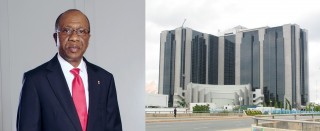Yesterday, the Central Bank of Nigeria (CBN) announced that it has disbursed funds to two out of the 27 states that applied for a federal government bailout. The CBN said that Zamfara and Kwara states received funds first because they met the requirements for the bailout. This development was a result of decisions made at the NEC meeting held on June 29, 2015. At the meeting, the Federal Executive Council (FEC) asked the CBN and other stakeholders to evaluate and consider ways of liquidating the outstanding workers’ salaries owned by states.
The requirement for accessing the bailout included getting resolutions from the state executive councils authorising the borrowing, getting consent to the loan package from state houses of assembly, as well as the issuance of an Irrevocable Standing Payment Order (ISPO) to ensure timely repayment.
People have said that the government gave funds to these states because thier governors are members of the ruling APC party or are from Northern Nigeria like President Buhari.
Only #Kwara and #Zamfara among 27 states met the requirements #Bailout – #CBN Regionalism, Bad Governance or NGF n Saraki’s factors! Humm!
— Kaura #MrProbe (@KauraKaura1) August 27, 2015
This is the second phase of the bailout since President Buhari assumed office in May of 2015. After the meeting with the FEC in June the president approved the disbursement of $1.6 billion paid into the Federation Account by the Nigerian Liquefied Natural Gas (NLNG) Company for partial distribution to the states for the outstanding salary paiments. He also approved the release of an additional N300 billion the CBN Special Intervention Fund for the payment of salary arrears and other pressing financial obligations.
President Buhari pressed for the restructuring of the state’s commercial loans with the banks through either bond issuances or long tenure loans of not more than 20 years. Twenty states took advantage of the intervention by applying to Nigeria’s Debt Management Office (DMO) for the restructuring of their debts into Federal Government bonds. Of the 20 states that applied for debt restructuring, 11 were approved.
While the bailouts are clearly welcome news for state government officials, finance industry experts are asking if this is just a case of kicking the can down the road as many states lack the revenue generating capacity to pay back these loans. Some private institutions have taken matters into their own hands to seek debt repayment. For example, in July of 2015, it was reported that Ecobank Bank sued Zamfara state over N3.2 billion debt.
What the CBN bailout means
A CBN staff told Ventures Africa that a bailout is a restructuring of loan on more favourable terms. The Zamfara and Kwara state bailouts come with a single digit interest rate and an extension of the current loan term to 20 years from the original seven. This should reduce the debt servicing costs of each sate and free up valuable cash to meet other existing obligations. If the states utilize the money efficiently, they should be saved from going bankrupt again.








